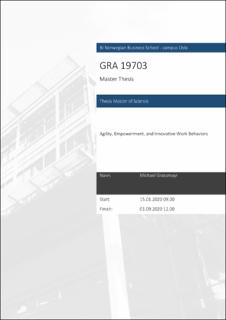Agility, Empowerment, and Innovative Work Behaviors
Master thesis
Permanent lenke
https://hdl.handle.net/11250/2687949Utgivelsesdato
2020Metadata
Vis full innførselSamlinger
- Master of Science [1621]
Sammendrag
Digital market disruption, changing consumer preferences, and the current COVID-
19 crisis require organizations to transform their business models and offerings.
Especially large corporations face challenges in creating highly creative and
innovative products and services. This case study analyzes the impact of an agile
organizational structure on employee empowerment and the innovative work
behavior in a large Scandinavian bank. The company transformed a strategic,
technical unit to be self-organized two years ago and experienced increased
efficiency and innovation as well as more playful and customer-centric solutions
since implementation. Agile work methods use prototypes, testing, and customer
feedback to ensure that the iterative innovation process creates valuable solutions
for customers. The workload and number of open projects need to be limited to
avoid adverse effects of high employee empowerment, especially burn out. Data
from ten qualitative interviews show that increased autonomy and decentralization
lead to higher levels of employee empowerment and innovative work behaviors.
Beskrivelse
Masteroppgave(MSc) in Master of Science in Business, Leadership and Change - Handelshøyskolen BI, 2020
